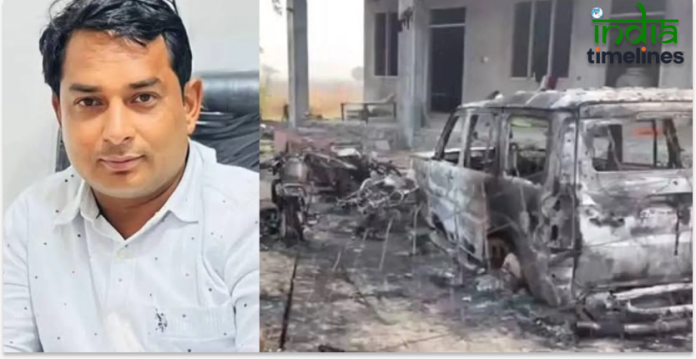
The recent bypolls in Rajasthan turned violent in Tonk district, where election-related tensions escalated into chaos, leaving significant concerns about safety and order during elections. An incident involving the assault of a Sub-Divisional Magistrate (SDM), stone-pelting, and vehicle torching has shaken the region, leading to the arrest of 60 individuals. This article examines the events, the underlying causes, and the wider implications of this violence on Rajasthan’s electoral environment.
Background of the Rajasthan Bypolls
Bypolls were held in Rajasthan to fill vacant seats, bringing political fervor back to the forefront. The region has long been known for intense electoral battles, with parties vying for control and local influence. These bypolls saw active campaigning by major political parties, with an already heightened sense of anticipation and tension in the area.
Escalating Tensions and the Incident in Tonk
The situation in Tonk had been tense, as rumors and fierce rhetoric fueled emotions among voters and supporters. With political stakes high, minor disputes and political disagreements quickly escalated. In the case of Tonk, tensions burst into violence when the SDM was allegedly assaulted, which only further ignited clashes.
The Assault on the SDM and Escalation to Violence
The SDM, acting as a local election authority, was reportedly assaulted in an attempt to enforce rules and maintain order. His intervention led to clashes that soon spiraled out of control. Following the assault, protesters resorted to stone-pelting, damaging property and threatening the security of voters and officials alike. Vehicles were torched in the process, and attempts to contain the violence initially struggled to be effective.
Police Response and Arrests
The local law enforcement quickly mobilized, aiming to regain control of the situation and ensure the safety of citizens and election staff. Officers responded by detaining suspects, and 60 individuals were arrested in connection with the violent acts. The arrests were aimed at curbing further disruptions, as well as sending a strong message about the consequences of election-related violence.
Impact on the Voting Process
The outbreak of violence disrupted the voting process, affecting both voter turnout and the morale of election officials. Fearing for their safety, many voters hesitated to approach polling stations. The incident highlighted the need for heightened security and clear strategies to address such events, as election officials and voters called for additional protective measures.
Local and Political Reactions
The incident sparked strong reactions among local residents, political leaders, and officials. Statements from authorities emphasized the importance of peaceful elections, condemning the violence and reiterating their commitment to justice and security. Political parties, on the other hand, issued statements that both condemned the violence and, in some cases, pointed fingers at their rivals.
Implications for Rajasthan’s Political Landscape
The violence in Tonk serves as a stark reminder of the challenges faced in maintaining order during elections, particularly in areas with historical political tensions. The incident may influence future election strategies, with an emphasis on increased security, stricter enforcement of regulations, and community engagement initiatives to foster peaceful electoral processes.
Conclusion
The violence witnessed in Tonk during the Rajasthan bypolls raises critical concerns for future elections. The incident underscores the necessity for proactive measures, including enhanced law enforcement and community outreach, to prevent similar disruptions. Moving forward, ensuring peaceful and secure elections will be crucial for the stability and democratic integrity of Rajasthan.
FAQs
1. How many individuals were arrested in the Tonk incident?
Sixty people were arrested in connection with the violence in Tonk, with charges related to assault, vandalism, and arson.
2. What role did the SDM play in the incident?
The SDM attempted to enforce election rules, which led to an escalation as he was assaulted by agitators.
3. How did law enforcement respond to the violence?
Police responded by securing the area and detaining individuals involved, with an aim to restore peace and ensure safe voting conditions.
4. Did the incident impact voter turnout?
Yes, the violence likely deterred some voters from approaching polling stations, impacting voter turnout.
5. What are the future implications of this incident for Rajasthan elections?
The incident has prompted calls for stronger security and preventive measures in future elections to ensure a peaceful and orderly voting environment.

































